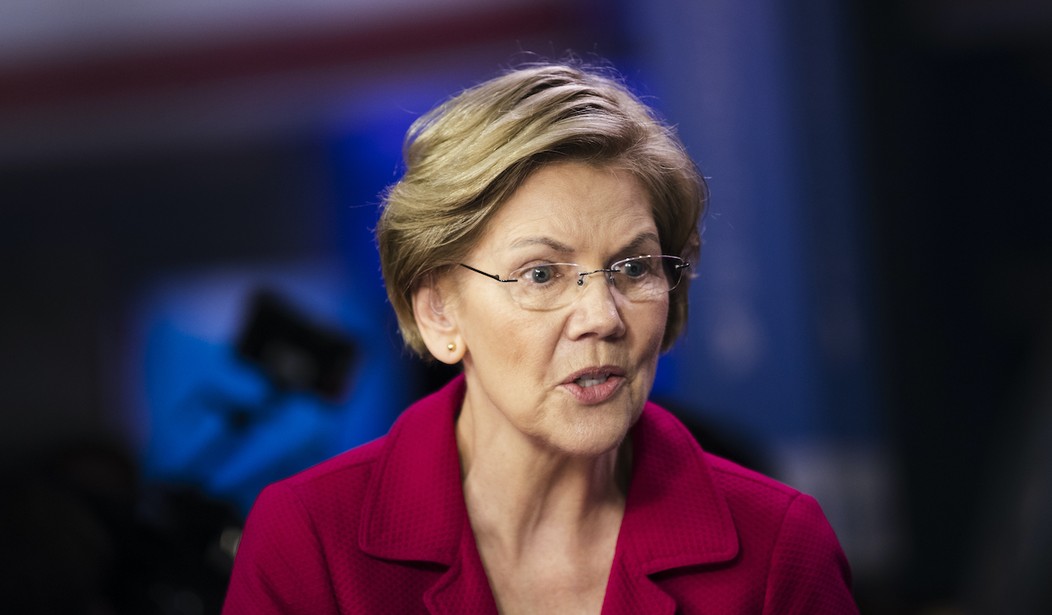Elizabeth Warren has never met a problem that she didn't 1) attribute to 'corporate greed' and 2) think she could solve with more government intervention.
This time, she's pouncing on Red Lobster's recent bankruptcy, blaming corporate greed.
Red Lobster's bankruptcy was caused by endless greed, not endless shrimp.
— Elizabeth Warren (@SenWarren) May 25, 2024
It's the private equity playbook: take over a company, loot the profits, load it up with debt and leave communities, workers, and customers holding the bag.https://t.co/kq7OfVWXhH
Here's what Fast Company writes:
The first of the owners in question was a private-equity firm called Golden Gate Capital, which bought Red Lobster in 2014 from Darden Restaurants, which owns a number of different restaurant brands, including Olive Garden and LongHorn Steakhouse. Typically, when a private-equity firm takes over a company, it finances the acquisition by loading the company down with debt, which makes the deal cheaper for the PE firm but also makes it harder for the company to thrive. In Red Lobster’s case, though, the problems went beyond that. While Golden Gate Capital did add debt to Red Lobster’s balance sheet, it also made another move, selling off Red Lobster’s real-estate assets for $1.5 billion, forcing Red Lobster to lease those locations back.
These kinds of sale-leaseback deals are not unusual in retail or the restaurant business. And for Golden Gate, it was a great arrangement, since the deal covered most of what it had paid for Red Lobster. For Red Lobster itself, though, the arrangement was less than ideal. These were long-term leases, with rent increases written into the contract. And the leases were what are called “triple-net” leases, which meant that Red Lobster was responsible for all the operating expenses, property taxes, and insurance at the locations. As Restaurant Finance Monitor wrote at the time, the deal gave Red Lobster “little room for error” at a moment when it was struggling with falling sales and a weak brand.
Recommended
X users were quick to point out the flaw in this thinking:
Another swing and a miss, by Dances with Lies.
— Deebs (@DeebsFLA) May 25, 2024
Big swing and a miss.
AI begs to differ:
— Marc Cocteaustan (@Igor_Cocteau) May 25, 2024
The restaurant industry has faced challenges in bouncing back from the pandemic, dealing with rising labor costs due to minimum wage hikes and a tight labor market, as well as a three-year-long spike in wholesale food prices and inflation.
All of this is true.
Remember, when you used to rail about “millionaires and billionaires”, and then you became a millionaire so you stopped complaining about them and now you’ll only complain about corporations and billionaires?
— 100 Proof 🥃 (@ChampionCapua) May 26, 2024
I do.
We do, too.
Chief, not everything is caused by greed. I suggest you have a pow wow with whichever staffer sent this tweet and make them delete it. Endless shrimp bankrupted Red Lobster. 🦞
— Burt Macklin (@BurtMaclin_FBI) May 25, 2024
And COVID lockdowns, and inflation, and government policies concerning businesses, wages, etc.
What tax the rich looks like: pic.twitter.com/zD7inEkhcF
— Dima Campbell (@MuricanMemez) May 25, 2024
Must be nice.
Yeah, we know, you honest politicians are SOOO against private equity.. pic.twitter.com/wqS0odUOkG
— ConfirmBias (@Fulcrumbs44) May 25, 2024
Only other's private equity and wealth. Not theirs.
Under Joe Biden and the Democratic Party the last three years, small business owners report the lowest confidence ever for their ability to survive.
— Scott Mason (@hypnoksa) May 25, 2024
Best economy ever, Jack!
How does this leave communities holding the bag? Because they can no longer have cheap, endless shrimp?
— Ben Dempsey (@BenDempsey18) May 25, 2024
The company went out of business. The only people holding the bag are investors.
Because she's using all the buzzwords.
Sounds like a playbook you wrote. Go to DC load the country up on debt, leave communities, workers holding the bag. You’ve minted millions for yourself selling inequity.
— Colette Harrington (@sweetcarolinatv) May 25, 2024
But it's okay when politicians do it.
Have you ever read a book on economics?
— Hank Venture (@HankVenture5) May 25, 2024
No, she has not.
You were paid $430k to teach at Harvard and charge $40k for speaking fees. https://t.co/Vh1WtNKhJJ
— Chad Felix Greene 🇮🇱 (@chadfelixg) May 25, 2024
We're not supposed to notice that.
She's still not over that Manhattan private equity deal her people did with the Dutch. https://t.co/tPacrhQMAT
— NeverTweet (@LOLNeverTweet) May 25, 2024
We laughed out loud.
Isn't it weird how all these companies only get greedy when a Democrat is president? https://t.co/Jf3rbqwIM2
— jimtreacher.substack.com (@jtLOL) May 25, 2024
Totally weird.
You’re worth millions and millions of dollars why https://t.co/Pa5aFMnPvo
— Dana Loesch (@DLoesch) May 25, 2024
Excellent question. Why, Lizzy?

























Join the conversation as a VIP Member